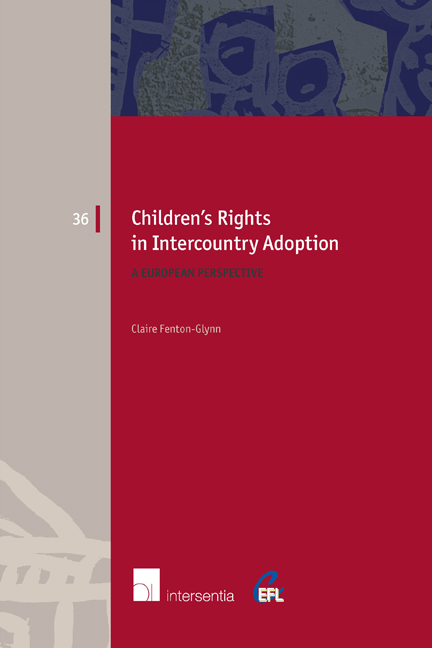Book contents
- Frontmatter
- Dedication
- Acknowledgements
- Contents
- Table of Cases
- Chapter 1 Introduction
- Chapter 2 Combating Abuses: International and Regional Regulation
- Chapter 3 Intercountry Adoption and the Domestic Child Welfare System: The Principle of Subsidiarity
- Chapter 4 Consenting Adults: Giving and Receiving Consent to Adoption
- Chapter 5 Buying Babies: The Inducement of Consent
- Chapter 6 Compulsory Adoption: Adoption Without Consent
- Chapter 7 Child Participation: Autonomy and Protection
- Chapter 8 Adoptive Parents: Eligibility, Preparation, and Support
- Chapter 9 Who Am I? The Child's Right to Identity
- Chapter 10 Conclusion
- List of Legislation
- Literature
- Index
- About the Author
- Miscellaneous Endmatter
Chapter 4 - Consenting Adults: Giving and Receiving Consent to Adoption
Published online by Cambridge University Press: 26 November 2017
- Frontmatter
- Dedication
- Acknowledgements
- Contents
- Table of Cases
- Chapter 1 Introduction
- Chapter 2 Combating Abuses: International and Regional Regulation
- Chapter 3 Intercountry Adoption and the Domestic Child Welfare System: The Principle of Subsidiarity
- Chapter 4 Consenting Adults: Giving and Receiving Consent to Adoption
- Chapter 5 Buying Babies: The Inducement of Consent
- Chapter 6 Compulsory Adoption: Adoption Without Consent
- Chapter 7 Child Participation: Autonomy and Protection
- Chapter 8 Adoptive Parents: Eligibility, Preparation, and Support
- Chapter 9 Who Am I? The Child's Right to Identity
- Chapter 10 Conclusion
- List of Legislation
- Literature
- Index
- About the Author
- Miscellaneous Endmatter
Summary
When family reunification and other alternative care mechanisms are not appropriate or have been exhausted, the focus must shift to ensuring that the adoption process is completed in a manner that safeguards the rights of the child. The following chapters will consider the issue of parental consent to adoption – who must give it, how it can be obtained, and when it can be dispensed with.
While obtaining parental consent may initially be seen as relating primarily to parental rights, this is an area of the law where stronger safeguards for parents can lead to greater protection for the child involved. Ensuring appropriate consent pursues two primary goals: first, preventing the unnecessary separation of families; and second, ensuring that placements are not disrupted. Where consent has been obtained in a legitimate manner, the child is not deprived of the right to stay with his or her family wherever possible, whereas an effective mechanism for dispensing with consent where appropriate ensures that the child is protected and placed in a new family where this is necessary. On the other hand, it is also in the interests of the child to be secure in his or her new family placement, and for this not to be challenged at a later date where consent has been improperly obtained or dispensed with, making it vital that appropriate procedures are followed from the beginning.
The UNCRC does not concern itself greatly with the issue of consent to adoption. Although article 21(a) refers to the need for “the persons concerned [to] have given their informed consent to the adoption on the basis of such counselling as may be necessary”, it fails to go into further detail as to who the “persons concerned” may be, when consent may be given, what form it must take, or the process by which such consent may be overridden.
The Hague Convention goes into somewhat more detail regarding the conditions for consent, although it still leaves many areas unexplored. Chapter II of the Convention establishes certain requirements that must be met before an intercountry adoption can take place, allocating responsibility for meeting these requirements between states of origin and receiving states.
- Type
- Chapter
- Information
- Children's Rights in Intercountry AdoptionA European Perspective, pp. 51 - 80Publisher: IntersentiaPrint publication year: 2014

